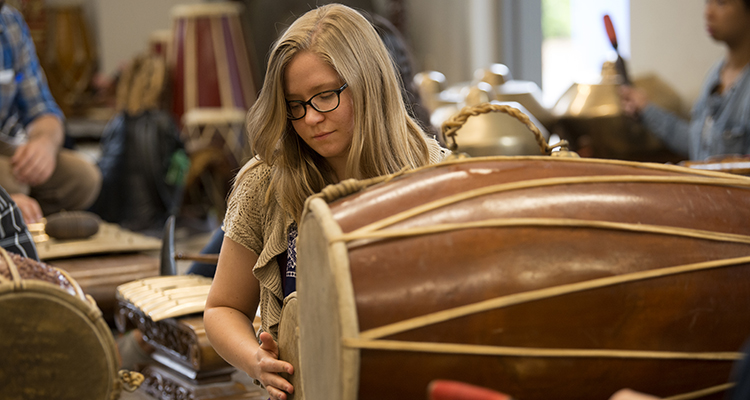Gillian Irwin ‘13 Receives Second Fulbright Award
Muhlenberg alumna will travel to Indonesia to research the effects of its music education programBy: Meghan Kita Sunday, September 3, 2017 03:01 PM
 Gillian Irwin ‘13 plays Javanese gamelan. (Photo courtesy of the University of California, Davis.)
Gillian Irwin ‘13 plays Javanese gamelan. (Photo courtesy of the University of California, Davis.)Gillian Irwin ‘13 first arrived in Indonesia in the fall of 2011 by process of elimination: She was interested in a specific type of study-abroad program that includes a field-research component as part of the curriculum. She also wanted to travel to Asia for the first time and to continue working toward her majors, English and music. With the help of Donna Kish-Goodling, dean of global education and professor of economics, she realized just two programs met her criteria: one in Bali and one in New Delhi.
“I wasn’t so sure about spending a semester in New Delhi, as a person who’s not too fond of cities,” Irwin says, so she committed to Indonesia—a country she knew little about—and spent the time before she departed reading up on her temporary home-to-be.
Now, six years later, Irwin has earned a Fulbright Research Award to support her continued interest in the country and its culture. It’s her second honor from the program; her first, a Fulbright English Teaching Assistantship (ETA), brought her to Yogyakarta, Indonesia, shortly after she graduated from Muhlenberg. The Fulbright Program has bestowed 22 awards (including Irwin's) on Muhlenberg alumni. Irwin is the first Muhlenberg graduate to earn two.
Gillian and other award recipients are supported by the offices of the dean of academic life and the provost. The offices work closely with students, offering services from academic advising to summer research grants to conference travel to applying for national and international awards.
“The number of students who end up receiving two Fulbright awards is relatively small nationwide because it’s an extremely competitive process,” says Chris Herrick, professor of political science, director of the international studies major and faculty advisor for postgraduate awards. “That speaks volumes about how superior a student Gillian is and the extent to which her project would be of significant interest nationally. She’s going to be immersed in the culture there, and she will become a national asset. That clearly is something Muhlenberg can be very proud of.”
Irwin plans to research the relationship between the perceived morality of Indonesian students and music education, an idea inspired by her first stint in Yogyakarta, when the government had just introduced a new curriculum for primary and secondary students.
“It was seen in the country that the moral quality of the students was failing,” Irwin says. “There was more bullying and more drug abuse, and the idea that we need to do something to fix this.”
That “something” was the new curriculum, one that dedicated less time to subjects like science and social studies and more time to religious and cultural instruction. Through interviews with government officials, library and archival research and in-person observations of traditional music classes, Irwin hopes to learn about the effects of the curriculum’s adoption. Her research will go toward her dissertation; she’s currently pursuing her Ph.D. in ethnomusicology (the study of the role music plays in a culture) at the University of California, Davis.
“Karen Hiles (a former music professor at Muhlenberg) really helped nurture my interest in ethnomusicology and helped me figure out it was something I might want to go into,” Irwin says.
Irwin’s fascination with Indonesia is not just academic: She plays Javanese gamelan, traditional music created by an orchestra of drums, gongs and other percussion instruments (see photo, above).
“I knew nothing about Indonesia before I chose to go there, and now I feel like an evangelist for Indonesian culture,” Irwin says. “My semester abroad opened my eyes to different types of study and what ethnographic research could be like, and I love the country so much.”
